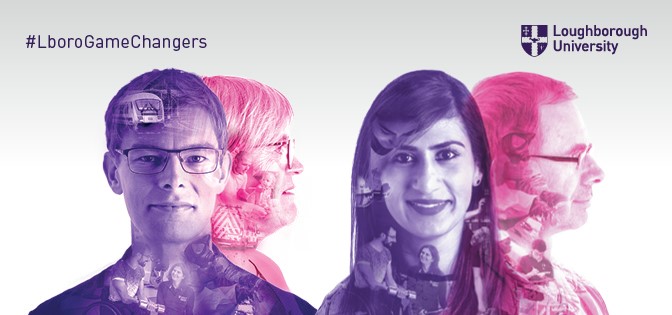The international initiative led by Loughborough University, in partnership with Queensland University of Technology, Australia, and Tongji University, in China, has been part-funded by Research England as part of a project to boost international collaborations.
The new centre aims to save lives and prevent injuries to young and elderly pedestrians, cyclists, motorcyclists and sensory-impaired road users by providing the motor industry with new research about how autonomous vehicles and vulnerable road users interact.
Vulnerable road users (VRUs) account for 59% of those either killed or seriously injured in collisions involving cars and other vehicles.
Centre director Professor Andrew Morris, of the Transport Safety Research Centre, in the School of Design and Creative Arts, said the rapid introduction of driverless cars, also known as connected and autonomous vehicles (CAVs), within the transport system raises new technical and ethical challenges for manufacturers and regulators.
He said: "We are delighted and honoured to be working with such prestigious research institutions as CARRS-Q, at the Queensland University of Technology, and the International Research Laboratory of Transportation Safety, at Tongji University.
"I think this collaboration will make us a very powerful force with respect to ensuring that the introduction of CAVs is not detrimental to safety.
“To be successful, future CAVs must be fully and safely integrated into the future mobility environment.
“Therefore, I3 investment will be used to bring the collective knowledge, skills, resources and facilities of the 3 universities to develop an international centre capable of tackling key emerging issues related to the rapid transition towards CAVs within the transport system.
“The UK already has a reputation as a world-leader in CAV technology – a sector that is predicted to be worth £63 billion by 2035, and the UK government has pledged that the UK should retain such leadership in the years ahead.
“However, associated with the introduction of CAVs on the roads are a range of technical and ethical challenges.”
There have been several reports worldwide of injuries to road-users who have come in contact with autonomous vehicles.
Last December, an Arizona woman pushing a bicycle across the road was killed when a self-driving test car had trouble classifying her as a pedestrian and failed to stop.
According to the local police, the car's test driver was watching TV on her phone at the time of the accident.
A report by the National Transport Safety Board said that the test driver did not look up until half a second before the fatal collision and did not press the brakes until less than a second after impact.
Prof Morris said: "There are concerns about how a vehicle with a driver inside, who is only partially engaged with the driving task, will be able to respond to traffic situations where more vulnerable road-users are present.
"At the moment, in many situations there is an implicit communication code between driver and pedestrian - for example, crossing the road.
"This will disappear with vehicle autonomy”.
"It's important to ensure that these safety implications do not go unrecognised."
The centre will gather accident data from around the world and will seek data from experimental trials as well as through questionnaires and focus groups.
PhD students - up to a dozen based across the three universities - will also interview road users and publish their findings in recognised journals.
All of the data gathered will be made available to the motor industry and will be presented at a series of seminars and an international conference scheduled for 2023.
Some of the key research questions posed by the centre include:
- How can CAVs be fully integrated into future mobility systems to ensure that the benefits of CAVs are experienced by all members of society especially VRUs?
- Internal VRUs (CAV passengers) – should crashes occur, how can children, elderly, impaired and other vulnerable groups be protected when they may be seated in non-standard positions and may be unrestrained?
- External VRUs – how can CAVs successfully detect pedestrians, cyclists and other VRUs and predict their behaviours in order to identify and avoid collision risks?
- What are the specific requirements for CAVs to interact appropriately with VRUs? How can we develop transparent two-way communication between the vehicle and human?

Data published in 2018 suggested that VRUs are now much more likely to be killed in urban traffic accidents compared to car occupants.
Of even greater concern is that there is limited recognition of the full impact that the introduction of CAVs will have on the VRU group.
The associated objectives of the international research centre are, therefore:
- To utilise investment funding to undertake internationally leading research that will save lives and prevent injuries;
- To develop a coordinated research agenda and knowledge-exchange across the 3 organisations, and to promote the agenda through collaborative research;
- To utilise investment funding to develop a PhD level skills-base thereby ensuring a pipeline of world-leading researchers in the field of VRU safety;
- To influence research-funders to support this challenge;
- To establish an advisory group of international stakeholders to ensure the programme is closely aligned with the research needs of practitioners globally;
- To maximise the opportunity for each partner to benefit from national research investments – and through sharing of such investment to provide three times the benefit of UK-only funding;
- To ensure that the centre and the partnership are sustainable and will continue to operate at both a high strategic and research level well beyond the end of the funding period.
The project is one of the first investments to be made through Research England’s International Investment Initiative (I3).
It will receive £436,067 via the scheme.
In total, Research England will invest £3.6m into international collaborations led by UK universities.
The partnerships, involving collaborators from Canada, Australia, Singapore and Finland, will address major industrial and societal challenges in healthcare, sustainable technologies and artificial intelligence.
Research England’s Director of Research Steven Hill said: “Research England’s mission is to create and sustain the conditions for a healthy and dynamic research and knowledge exchange system in English universities.
“One-way Research England seeks to accomplish this mission is by providing performance-based, institution-focussed funding to deliver excellent research and high-performance knowledge exchange, unlocking potential, generating economic and social impact, and meeting national priorities and global challenges.
“Global collaboration is an increasingly important factor in research and innovation success, supporting access to talent, resources and markets that are not available nationally, and the I3 scheme is one of a range of existing and new policy measures that support Research England in achieving this goal.”
For more information about I3, following this link.

I3 funded projects
The eight bids to receive funding are:
Brunel University London
Bid title: UK and Finland: Research Collaboration for Prosperity and Health
Partner(s): Tampere University (Finland)
Investment: £343,918
Summary: The award will accelerate the development of a strategic partnership between Brunel and Tampere University in Materials & Manufacturing, Biomedical Engineering, Structural Integrity, Digital Technology, Water Resources and Ageing & Wellness. It will deliver benefits to the UK and Finland in the form of research competitiveness, societal impact and innovation.
Imperial College London
Bid title: Data 4.0: leading the fourth industrial revolution with data-driven technologies
Partner(s): Centre National de la Recherche Scientifique (CNRS, France), Technical University of Munich (Germany), Nanyang Technological University (Singapore)
Investment: £500,000
Summary: Imperial will establish Data 4.0 clusters in: Mathematical sciences, with France’s CNRS; AI and robotics, with Germany’s Technical University of Munich; Technology and healthcare, with Singapore’s Nanyang Technological University. Each cluster will; develop flagship international studentships, expand academic exchange, accelerate frontier research with seed funding, and launch bespoke doctoral programmes.
Liverpool John Moores University
Bid title: i-CARDIO – International Collaboration Assessing novel health models: A Research Design Intervention Opportunity
Partner(s): University of Western Australia (Australia)
Investment: £488,829
Summary: The UK faces a growing crisis of physical inactivity and associated disease risk. In Australia "registered exercise professionals" support the healthcare system and have reduced healthcare costs. This system does not exist in the UK and this award will evaluate healthcare model development in Australia and pathways to changes in the UK.
Loughborough University
Bid title: An International Research Centre to study the effects of Connected and Autonomous Vehicles on Vulnerable Road-Users
Partner(s): Queensland University of Technology (QUT, Australia), Tongji University (China)
Investment: £436,067
Summary: This project will scale up an existing strategic, international collaboration between 3 world-leading research centres - Loughborough University (UK), Queensland University of Technology (Australia) and Tongji University (China). It will establish a new International Research Centre to study the impacts of Connected and Autonomous Vehicles on Vulnerable Road Users’ safety.
Newcastle University
Bid title: Newcastle University/Monash Academic Track (NUMAcT) scheme
Partner(s): Monash University (Australia)
Investment: £500,000
Summary: Building on the recently launched and extremely popular NUAcT scheme supporting researchers making the transition to independence, NUMAcT will allow investigators to work in two long-standing partner Universities, Newcastle and Monash. The initial focus on drug discovery provides complimentary access to world-class facilities, expertise, and bespoke training and mentorship.
University of Birmingham
Bid title: Industrialisation of Energy, Waste and Recycling
Partner(s): Fraunhofer Institute for Environmental Safety and Energy Technology (UMSICHT, Germany), Jiangsu Industrial Technology Research Institute (JITRI, China)
Investment: £499,099
Summary: Investment of £2.6m, made up of nearly £0.5m from Research England, and £2.1m co-investment, over five years will scale up the partnerships between the University of Birmingham, Fraunhofer Institute for Environmental, Safety, and Energy Technology, and Jiangsu Industry Technology Research Institute. This three-way multi-country bridge will provide a comprehensive research and innovation pipeline from fundamental research to close-to-market innovation.
University of Brighton
Bid title: 3DMed - Anglo Canadian Collaboration on Interface Science for Medical Innovation
Partner(s): York University (Canada)
Investment: £455,080
Summary: 3DMed scales up a well-established strategic collaboration between University of Brighton, UK and York University, Canada. The project will capitalise on the synergy between programmes of excellent research in engineering and biomedicine to develop industrial applications and novel research skills in 3D bio-printing and additive biomedical manufacturing technologies.
University of Hull
Bid title: Building Critical Mass for Palliative Care Research through Collaborative Support, Exchange and Challenge
Partner(s): University of Technology Sydney (Australia)
Investment: £403,510
Summary: This award will increase the scale and impact of our international collaboration between the Wolfson Palliative Care Research Centre, University of Hull, and the Improving Palliative and Chronic Care Through Clinical Research and Translation group, University Technology Sydney, forming critical mass to drive societal benefit through high-quality palliative care research.
Funding for these projects will run for five years, starting in August 2019, allowing successful institutions sufficient time to scale up their international collaborations.
ENDS

